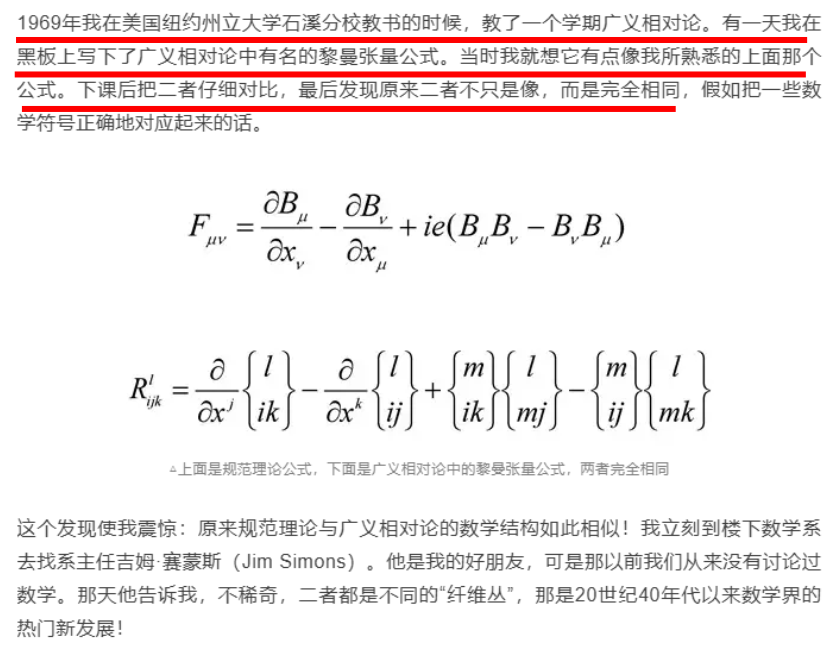 精选
精选
有位1980年代北京大学技术物理系原子核物理专业毕业的高材生,也是我非常尊重的一位朋友和同行,六十岁退休了。他对于”过早”退休还有些不太适应,去年我们见面的时候,他对我说:“我才知道如何搞好教学,却时不再来了。”
他的感受和很多彪炳史册的科学巨人的感受类似,不过一个指向状态,一个指向过程。巨人们没有退休的压力,他们如何看待教学非常具有启发性。本文给出三个诺贝尔奖获得者的亲身体会。他们认为,课堂教学能把思维激发到非常活跃的程度,不只是前沿科研课题的一个来源,还是解决重要科研课题的一个场所。
一,杨振宁上课的时候突然领悟到了规范场的几何性

(来源:杨振宁,20世纪数学与物理的分与合,《环球科学》2008 年第 10 期。一直到了2008年,杨先生才提到是上课过程中才发现二者之间的联系。其实,他第一次提到二者之间的关系,是1982年的《选集和后记》中。他写道:“我因而明白了,从数学观点看来,规范场在根本意义上是一种几何的概念。” )
二,沃森认为教学可以把思想引向大问题
1.教学可以把你的思想引向大问题
能从轻微或者根本没有教学任务中获益的大研究家们,或许能善用一个思想家无力承受的奢侈(根据上下文可以推知这个奢侈指的是即使没有教学任务,头脑也能保持高度活跃。为什么把这称之为奢侈,可能有些调侃。----博主注)。确认相互矛盾观察结果的迫切需要对我是一种挑战,没了这一挑战我的脑子经常很慢(一旦有了这一挑战,我就会马上上讲台,就可保持脑袋高速运转。----博主注)。有些实验结果难以解释,紧紧抓住这些结果的那种强烈愿望,就是上课讲授这些内容的必要性所在。高年级的本科生和研究生是最好的听众,他们已经有了足够的知识,他们会有所反应,这就会碰出有见解的火花。1970年代早期,在一团不确定的迷雾中讲解DNA 复制的时候,我突然明白了为什么病毒DNA分子有那么多末端,这些末端在病毒DNA分子的复制过程中联结了起来。这是处理它们的末端的一种方法,这么一个想法,太漂亮了,漂亮得不可能错。
(来源:文集《AVOID BORING PEOPLE》(有中译本,书名《不要烦人》) 中Remembered Lessons(教训堪记取)部分的第一条。原文是:
1. Teaching can make your mind move on to big problems
Eminent researchers who revel in trivial or nonexistent teaching loads may be availing themselves of a luxury no thinker can well afford. When I’m not challenged by an immediate need to make sense of incompatible observations, my mind too often runs slowly. A very strong incentive for coming to grips fast with unexplainable experiments is the need to lecture about them. For this the best audiences are advanced undergraduates or graduate students, who know enough to have reactions that may spark a flash of insight. In the early 1970s, when lecturing about DNA duplication in such a fog of uncertainty, I suddenly saw why viral DNA molecules have redundant ends that become linked during their replication processes. The idea that this was a device to copy their ends was too pretty to be wrong.)
三,温伯格认为教学是他建立场论理论体系的动机
......。当你讲授物理学的任何分支时,你都必须要有一个(自己的)理论体系。展示一个理论体系然后说它与实验相符是没有用的;你必须向学生解释为什么世界如此这般。毕竟,这是我们在物理学中的目标,它不仅仅能描述自然,而且能解释自然。在教授量子场论的过程中,我发展出来一个理性化的系统,用极简的语言说就是满足洛伦兹不变性原理、量子力学原理和另一个原理的唯一的理论体系。
(出处:Steven Weinberg, What is Quantum Field Theory, and What Did We Think It Is? Contribution to: Conference on Historical Examination and Philosophical Reflections on the Foundations of Quantum Field Theory (1-3 March 1996. Boston, MA, United States)241-251, e-Print: hep-th/9702027 [hep-th]
原文:(Now my point of view has changed. It has changed partly because of my experience in teaching quantum field theory. )When you teach any branch of physics you must motivate the formalism — it isn't any good just to present the formalism and say that it agrees with experiment — you have to explain to the students why this the way the world is. After all, this is our aim in physics, not just to describe nature, but to explain nature. In the course of teaching quantum field theory, I developed a rationale for it, which very briefly is that it is the only way of satisfying the principles of Lorentz invariance plus quantum mechanics plus one other principle.)
四,结语
不是只有诺贝尔奖获得者对教学情有独钟,杰出学者如华罗庚,施一公等,很多科研教学岗位的高校教师都有类似的经验和体会。
总之,授课即良机。当然,机会只是垂青有准备的人。
转载本文请联系原作者获取授权,同时请注明本文来自刘全慧科学网博客。
链接地址:https://wap.sciencenet.cn/blog-3377-1473759.html?mobile=1
收藏

